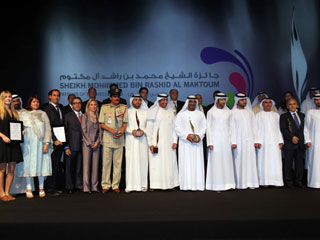
Dubai, April 10: The Shaikh Mohammed bin Rashid Al Maktoum Patrons of the Arts Awards, honoured 47 organisations and individuals for their contributions towards the city’s cultural scene at a prestigious event held on Sunday at the Jumeirah Zabeel Saray Hotel, in the presence of members of the royal family.
In its third edition, the ceremony opened with a delightful musical performance titled ‘Music of Dubai’ by The Fridge, and an artistic sand drawing projected at the back of the theatre inspired by the heritage of the UAE.
The awards included four categories: Distinguished Patrons of the Arts, Patrons of the Arts, Supporters of the Arts, and Friends of the Arts. Their financial or in-kind contributions have reached over Dh165 million and shows an impressive 24 per cent increase from January to December 2011 compared to 2010.
Saeed Al Naboodah, Acting Director General, Dubai Culture and Arts Authority, said: “Patronage for the Emirate’s cultural scene has grown rapidly over the last few years, underlining the impressive achievements recorded by Dubai in launching and hosting diverse cultural initiatives. The third cycle has seen increased support from government departments and organisations, in addition to a vast pool of new patrons, reinforcing interest in extending patronage to culture and the arts.”
“Today, Dubai has firmly positioned itself as a destination for culture and arts as a result of sustained support from the patrons, the unsung heroes, who highlight the artistic potential in the city. The Dubai Culture and Arts Authority is privileged to honour these individuals and organisations who contribute to further consolidating the city’s status as the region’s cultural hub,” he added.
Forty-four per cent of those honoured in the third cycle are new patrons, with a 17.5 per cent overall increase in patrons, underscoring an increased interest among organisations and individuals in driving the arts sector. Fifteen per cent of the patrons comprised Government departments and organisations, a 75 per cent increase compared with the first cycle.
Visual arts accounted for 50 per cent, followed by a remarkable increase in patronage for film, which accounts for 42 per cent of total contributions. Performing arts and literature accounted for a four per cent of this year’s patronage, each.
The ‘Distinguished Patrons of the Arts’ honourees are: Shaikh Hamdan bin Mohammed bin Rashid Al Maktoum, Crown Prince of Dubai and Chairman of the Dubai Executive Council; the Investment Corporation of Dubai (ICD); Jumeirah Group; Emirates Airline; Dr Farhad Farjam and Abraaj Capital.
Honourees of the ‘Patrons of the Arts’ are: Shaikha Manal bint Mohammed bin Rashid Al Maktoum, President of the Dubai Women Establishment, and wife of Shaikh Mansour bin Zayed Al Nahyan, Minister of Presidential Affairs; Shaikha Lateefa bint Maktoum bin Rashid Al Maktoum; Dubai Police; Dubai Duty Free; Al Serkal Family; Barjeel Art Foundation; Mr. Ramin Salsali; AGMC – BMW; Dubai Pearl and Van Cleef & Arpels.





Comments
Add new comment